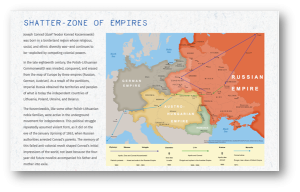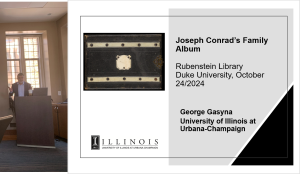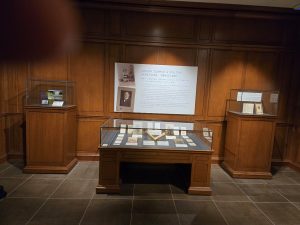On 24 October 2024, Duke University Libraries hosted a special open house and guest lecture to mark the opening of a new library exhibit, Joseph Conrad’s Polish-Ukrainian “Graveyard”: Memory, Mourning, and Anti-Colonial Resistance in his 19th-Century Family Photo Album.

This exhibit seeks to educate visitors about the little-known Polish-Ukrainian roots of the author of The Heart of Darkness. Focusing on the family photo album that the orphaned victim of Russian imperialism carried with him into permanent exile, the exhibit explores the role of early eastern European photography in commemorating acts of political resistance and mourning the trauma of collective and personal loss. In doing so, it also provides the historical background necessary for understanding the present-day military conflict in Ukraine.

During Thursday’s open house, the exhibit’s co-curators (Ernest Zitser, Librarian for Slavic, Eurasian and East European Studies at Duke University, and Kimberly Kresica, Records Description Archivist, State Archives of North Carolina) first thanked the exhibit sponsors (Josiah Charles Trent Memorial Foundation, E. Rhodes and Leona B. Carpenter Foundation, and Duke University’s Department of Slavic and Eurasian Studies) and expressed their gratitude to the team of Duke librarians who digitized Conrad’s family photo album and who helped to make this exhibit a reality. They then went on to explain the reasons why they embarked on this project in 2024—a year that coincides not only with the centennial of Conrad’s death (1924) but also the tenth anniversary of the start of Russia’s war against Ukraine (2014), the land of his birth.

The other speaker at the exhibit opening was George Z. Gasyna, Associate Professor in the Department of Slavic Languages and Literatures and the Program in Comparative and World Literature at the University of Illinois at Urbana-Champaign. This invited guest lecturer explained how Conrad’s personal trajectory influenced the Polish-English novelist’s approach to literature in general, and the writing of The Heart of Darkness in particular. Professor Gasyna concluded his presentation by discussing the way Conrad’s critique of European colonialism in Africa resonates today, during Russia’s neo-imperialist war against Ukraine.
After being treated to a selection of eastern European delicacies—including Polish chocolates, Ukrainian bottled water, and Russian marshmallows—visitors were invited to tour the physical exhibit together with the event speakers.
Joseph Conrad’s Polish-Ukrainian “Graveyard” is on view in the Michael and Karen Stone Family Gallery of Duke University’s David M. Rubenstein Rare Book and Manuscript Library until April 5, 2025. A digital version of this exhibit is also available online on the Duke University Libraries Exhibits website.





What a great exhibit! Thank you for working tirelessly and effortlessly to tie together events of the past to help shed light on events of the present. Eric, you are a rockstar!